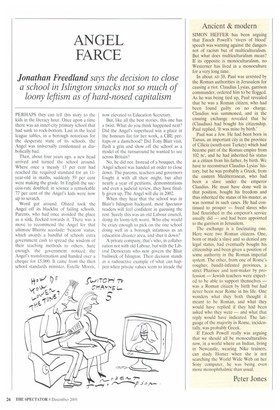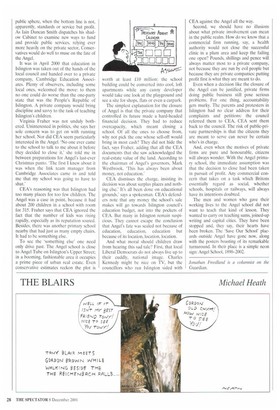ANGEL FARCE
Jonathan Freedland says the decision to close
a school in Islington smacks not so much of loony leftism as of hard-nosed capitalism
PERHAPS they can tell this story to the kids in the literacy hour. Once upon a time there was an inner-city primary school that had sunk to rock-bottom. Last in the local league tables, in a borough notorious for the desperate state of its schools, the Angel was universally condemned as diabolically bad.
Then, about four years ago, a new head arrived and turned the school around. Where once a measly 13 per cent had reached the required standard for an 11year-old in maths, suddenly 59 per cent were making the grade. In English the success-rate doubled: in science a remarkable 77 per cent of the Angel's kids were now up to scratch.
Word got around. Ofsted took the Angel off its blacklist of failing schools. Parents, who had once avoided the place as a sink, flocked towards it. There was a move to recommend the Angel for that ultimate Blairite accolade: 'beaconstatus, which awards a handful of schools extra government cash to spread the wisdom of their teaching methods to others. Sure enough, the government noticed the Angel's transformation and handed over a cheque for £5,000. It came from the then school standards minister, Estelle Morris,
now elevated to Education Secretary.
But, like all the best stories, this one has a twist. What do you think happened next? Did the Angel's superhead win a place in the honours list for her work, a CBE perhaps or a damehood? Did Tony Blair visit, flash a grin and show off the school as a model of the turnaround he wanted to see across Britain?
No, he did not. Instead of a bouquet, the Angel school was handed an order to close down. The parents, teachers and governors fought it with all their might, but after nearly a year of petitions, demonstrations and even a judicial review, they have finally given up. The Angel will die in 2002.
When they hear that the school was in Blair's Islington backyard, most Spectator readers will feel confident in guessing the rest. Surely this was an old Labour council, doing its loony-left worst. Who else would be crazy enough to pick on the one school doing well in a borough infamous as an education disaster area, and shut it down?
A private company, that's who, in collaboration not with old Labour, but with the Liberal Democrats who now govern the Blair bailiwick of Islington. Their decision stands as a radioactive example of what can happen when private values seem to invade the public sphere, when the bottom line is not, apparently, standards or service but profit. As fain Duncan Smith dispatches his shadow Cabinet to examine new ways to fund and provide public services, relying ever more heavily on the private sector, Conservatives would do well to muse on the fate of the Angel.
It was in April 2000 that education in Islington was taken out of the hands of the local council and handed over to a private company, Cambridge Education Associates. Plenty of observers, including some local ones, welcomed the move: to them no one could do worse than the one-party state that was the People's Republic of Islington. A private company would bring discipline and savvy to the task of teaching Islington's children.
Virginia Fraher was not unduly bothered. Uninterested in politics, she says her sole concern was to get on with running her school. Nor did CEA seem particularly interested in the Angel. 'No one ever came to the school to talk to me about it before they decided to close it,' she told me in between preparations for Angel's last-ever Christmas panto. The first I knew about it was when the link team manager from Cambridge Associates came in and told me that my school was going to have to shut.'
CEA's reasoning was that Islington had too many places for too few children. The Angel was a case in point, because it had about 200 children in a school with room for 315. Fraher says that CEA ignored the fact that the number of kids was rising rapidly, especially as its reputation soared. Besides, there was another primary school nearby that had just as many empty chairs. It had to be something else.
To see the 'something else one need only drive past. The Angel school is close to Angel Tube on Islington's Upper Street; in a booming, fashionable area it occupies a prime piece of urban real estate. Even conservative estimates reckon the plot is worth at least £10 million: the school building could be converted into cool, loft apartments while any canny developer would take one look at the playground and see a site for shops, flats or even a carpark.
The simplest explanation for the closure of Angel is that the private company that controlled its future made a hard-headed financial decision. They had to reduce overcapacity, which meant closing a school. Of all the ones to choose from, why not pick the one whose sell-off would bring in most cash? They did not hide the fact, says Fraher, adding that all the CEA documents that she saw acknowledged the real-estate value of the land. According to the chairman of Angel's governors, Mark Westbrook, 'This has always been about money, not education.'
CEA dismisses the charge, insisting its decision was about surplus places and nothing else.' It's all been done on educational grounds,' says a spokesman. CEA's defenders note that any money the school's sale makes will go towards Islington council's education budget, not into the pockets of CEA. But many in Islington remain suspicious. They cannot escape the conclusion that Angel's fate was sealed not because of education, education, education but because of its location, location, location.
And what moral should children draw from hearing this sad tale? First, that local Liberal Democrats do not always live up to their cuddly, national image. Charles Kennedy might be nice on TV, but the councillors who run Islington sided with CEA against the Angel all the way.
Second, we should have no illusions about what private involvement can mean in the public realm. How do we know that a commercial firm running, say, a health authority would not close the successful clinic in a plum area and keep the failing one open? Pounds, shillings and pence will always matter most to a private company, not because they are run by evil people but because they are private companies: putting profit first is what they are meant to do.
Even when a decision like the closure of the Angel can be justified, private firms doing public business still pose serious problems. For one thing, accountability gets murky. The parents and protesters in Islington had no clear address for their complaints and petitions: the council referred them to CEA, CEA sent them back to the council. The risk of public-private partnerships is that the citizens they are meant to serve can never be certain who's in charge.
And, even when the motives of private firms are pure and honourable, citizens will always wonder, With the Angel primary school, the immediate assumption was that the decision to close had been taken in pursuit of profit. Any commercial concern that takes on a task which Britons essentially regard as social, whether schools, hospitals or railways, will always have its intentions doubted.
The men and women who gave their working lives to the Angel school did not want to teach that kind of lesson. They wanted to carry on teaching sums, joined-up writing and capital cities. They have been stopped and, they say, their hearts have been broken. The 'Save Our School' placards outside Angel have gone now, along with the posters boasting of its remarkable turnaround. In their place is a simple neon sign: Angel School, 1890-2002.
Jonathan Freedland is a columnist on the Guardian.























































































 Previous page
Previous page